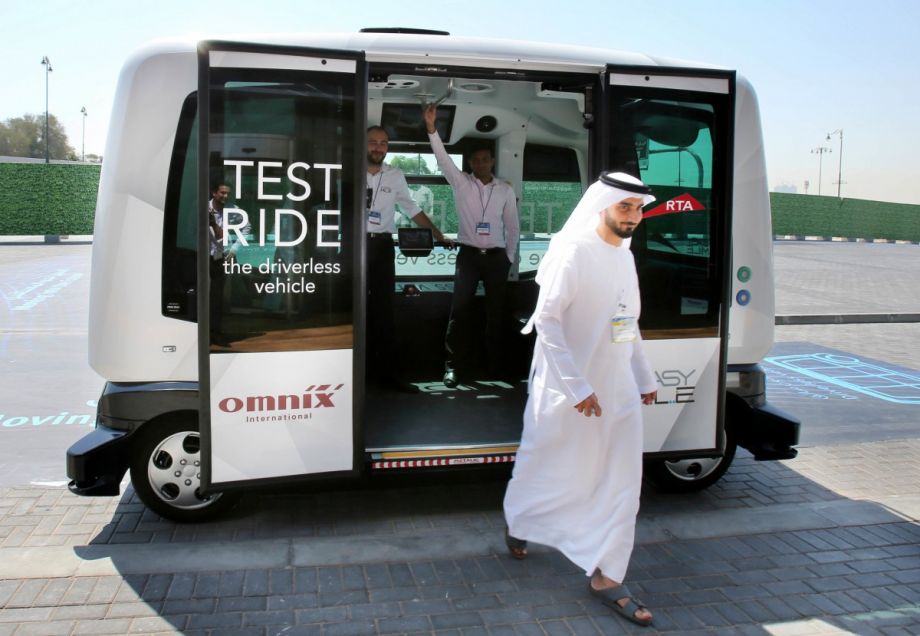Our weekly “New Starts” roundup of new and newsworthy transportation projects worldwide.
Driverless Cab Gets Put Through Its Paces in Dubai
The new year brings with it a new type of vehicle in one Dubai neighborhood: The autonomous taxi.
The Khaleej Times reports that Dubai’s Roads and Transport Authority and the Dubai Police launched a three-month-long test period for the emirate’s first driverless cab this past Monday (Dec. 31).
The cab will not pick up passengers during this trial phase, but will operate in regular traffic on the streets of the Dubai Silicon Oasis neighborhood.
The vehicle can carry four passengers plus a professional driver who can take over operation in case of an emergency. The cab can operate at speeds of up to 35 km/h (21.75 mph).
During the test period, the cab will operate on predetermined fixed routes within Silicon Oasis. Some passengers will be invited to ride in the cab during its trial run, and there will also be a preview event for the media.
In a report issued in the fall, Mattar Al Tayer, director-general and chairman of the RTA’s Board of Executive Directors, pitched autonomous cabs as a “last-mile solution” for public transport users.
“It will contribute to the integration of mass transport systems by facilitating the movement of public transport users, specifically Dubai Metro and Dubai Tram, to reach their final destinations,” Al Tayer said then.
At the end of the three-month trial, officials will analyze data gathered during the test to determine how best to introduce driverless taxis in other parts of the city. This project is part of an overall strategy to have 25 percent of all trips in Dubai using self-driving transit vehicles by 2030.
First Metro Line Opens in Jinan
The rapid pace of metro system development in China continues with the opening of the first metro line in Jinan, reported in Metro Report International today (Jan. 3).
Jinan Metro Line R1 connects Fangte and Gongyanyuan via a 26.3-km (16.3-mile) route with 11 stations. Seven stations are located along the 16.2-km (10.1-mile) elevated sections, while the remaining four are in a 10.1-km (6.3-mile) subway tunnel.
Four-car trains will provide initial service on the line. The stations can accommodate six-car trains, which if past history is any guide, will be needed sooner than officials expect. Work on the initial line began in 2015.
With the opening, Jinan, the capital of Shandong province with a population of 6.8 million, becomes the 35th city in China to have a rapid transit system. Two more lines are already under construction; Line R3 is set to open in January 2020 and Line R2 will open the following year.
Feds Award Portland Grant to Study Streetcar Expansion
Railway Age reports that the Federal Transit Administration has awarded Portland (Ore.) a grant of $1.076 million to examine potential development opportunities along a proposed 2.3-mile extension of the city’s streetcar network.
The proposed extension would serve Montgomery Park, a former industrial neighborhood in the northwest part of the city. Portland officials hope the streetcar would stimulate redevelopment of the area, in particular, a 24-acre tract where a steel mill once stood. The city is considering zoning changes to make mixed-use redevelopment of the area possible.
The extension would take three years to build and cost an estimated $80 million. It would also enable service to the Rose Quarter and Convention Center to operate twice as frequently as it does now.
Know of a project that should be featured in this column? Send a Tweet with links to @MarketStEl using the hashtag #newstarts.

Next City contributor Sandy Smith is the home and real estate editor at Philadelphia magazine. Over the years, his work has appeared in Hidden City Philadelphia, the Philadelphia Inquirer and other local and regional publications. His interest in cities stretches back to his youth in Kansas City, and his career in journalism and media relations extends back that far as well.
Follow Sandy .(JavaScript must be enabled to view this email address)









